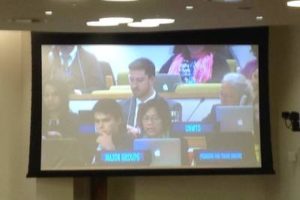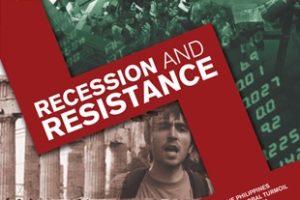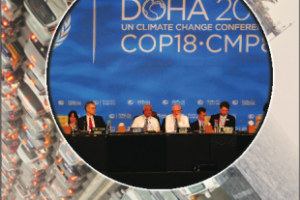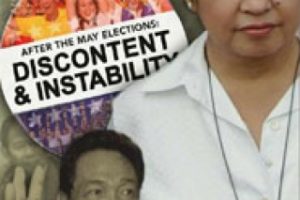Reportage from UNFCCC COP18 in Doha
Climate, Number 2
[[{“type”:”media”,”view_mode”:”media_large”,”fid”:”58″,”attributes”:{“alt”:””,”class”:”media-image”,”height”:”71″,”style”:”font-size: 12px; width: 310px; height: 71px; margin: 10px; float: right;”,”typeof”:”foaf:Image”,”width”:”310″}}]]
DOHA, November 29, 2012 — Four main items were discussed at today’s meeting of the Contact Group on Finance, i.e., general statements on the report on the work programme on Long Term Finance, the report of the Standing Committee, report on the Green Climate Fund (GCF) and initial guidelines; and on the arrangements between the Conference of Parties and the GCF.
Several Parties made brief remarks on procedural matters, particularly reiterating the need for the meetings to be transparent and open to observers, and clarifying that equal attention to the four agenda items does not necessarily mean equal allocation in time devoted to discussing these. The Chair reminded Parties that it has been decided that the first and last contact group meetings would be open as they need to produce agreed elements under finance by December 6th.
As regards the co-chairs’ report on the work programme on Long Term Finance, it was important to press ahead with concrete actions at political (covering scale and mobilization of climate finance) and technical levels (financing the GCF and the enhancement of enabling environments).
Japan and Saudi Arabia expressed discomfort over proposals on sources for LTF, particularly referring to the possibility of considering maritime transport levy as a fund source. Norway commended the report for exploring innovative fund sources, including carbon pricing.
The Philippines (on behalf of G77/China) noted that there are many institutions undertaking climate change financing but that there, too, are many different interpretations on what constitutes climate change financing. While mobilization of financing is a mandate of the COP, it is not just a matter of counting sources. What is more important is the predictability and accessibility of these resources to address climate change.
Bangladesh, supporting the G77 position, reiterated the need to have an understanding on what exactly is meant by climate finance. It added that some contributor nations do not differentiate between climate finance and official development assistance (ODA) or aid, and went on further to say that funding for climate action in Least Developed Countries are in the form of loans which goes against agreed UNFCCC principles. This was a position that was shared by Kenya and Uganda who declared that with the lack of an agreed definition of climate finance, there has been very little or even no distinction at all between ODA and climate finance.
The European Union commended the co-chairs’ report, which recognized that there is no single source that can address all climate financing aims. In finding pathways to scale up resources, the EU cited the very important role for the private sector, and cautioned on the dangers of “micro-managing” the GCF.
The United States commented on the difficulty of a political process under the COP ever coming to a decision on sources of climate finance, as Parties have very different ideas on this. It however, affirmed the Unites States’ commitment to deliver on the USD100-billion goal of Long Term Finance.
Saudi Arabia expressed concern over calls to take the discussions outside the Convention. It declared the UNFCCC as the rightful place for discussions and that the LTF must comply with principles of equity and common but differentiated responsibilities (CBDR). This was also position shared by Barbados (on behalf of AOSIS), Egypt (for the African Group), the Philippines and Pakistan.
There was a lively debate around the report of the Green Climate Fund Board to the COP. There was also a range of differing opinions as regards the nature of the arrangements between the GCF and the COP.
Australia expressed its satisfaction of the work done by the GCF Board, whose work only commenced in August. It commended the expressed priority areas of the Board, particularly on the business model and private sector facility.
The Philippines commented that the GCF Board report did not really address a number of the recommendations made by the decision that launched the GCF. The GCF has been designated in Durban as an operating entity of the financial mechanism of the Convention and as such, operates under the guidance of and is accountable to the COP. It was also concerned on the absence of clear rules of procedure governing the work of the GCF.
Saudi Arabia, Zambia and Kenya believe that the arrangement between two entities has to come from the higher-level entity that is going to operationalize that arrangement. The GCF Board is not in a position to define the arrangements between it and the COP, as there is a conflict of interest.
However, the United States pointed out that the issue of the relationship of the COP and the GCF had already been debated and settled in Cancun (COP 16). Without saying that the COP and GCF are equal in stature, the US pointed out that the GCF will have an independent juridical personality and the arrangement therefore would have to reflect the parity between the two entities. Japan supported the US position.
Colombia, speaking for Peru and Guatemala, proposed that representatives of both bodies work together in a cooperative manner on a draft arrangement and to come and present this at COP 19. Mexico affirmed the Colombian proposal.
China lent its support to South Africa, Egypt, Saudi Arabia and the Philippines, and said it was necessary to make arrangements in Doha to ensure that the GCF is accountable to the COP. ###




